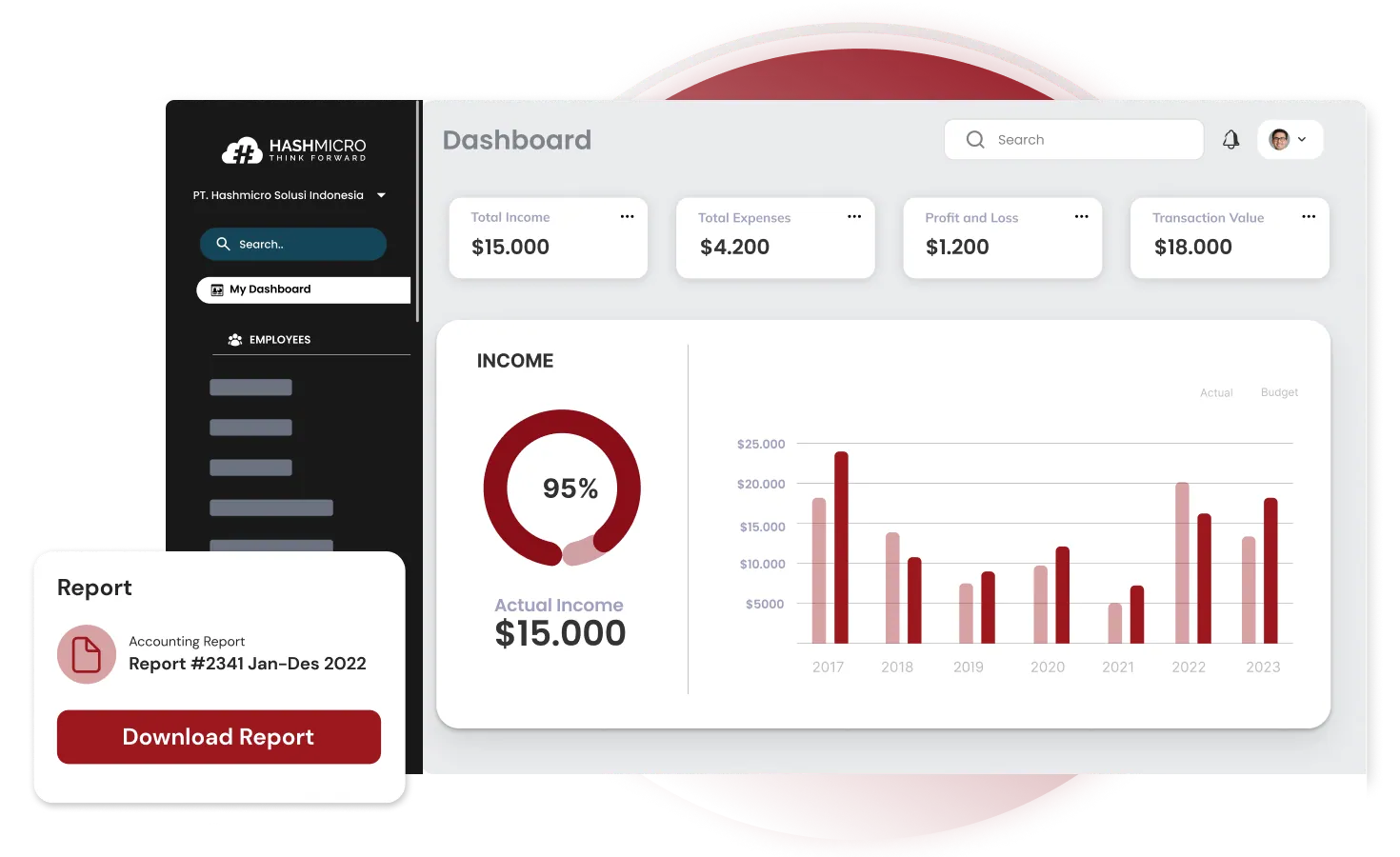Are you struggling to manage your company’s accounting effectively? Does complicated financial reporting and regulatory compliance slow down your company’s operations? Many companies face accounting challenges, regardless of their size and scope.
The ideal accounting system streamlines financial management and enhances record-keeping, thereby increasing accuracy and efficiency. Find out how the accounting software from HashMicro can support the accuracy and upholding of financial integrity.
Key Takeaways
|
Table of Content:
Table of Content

What is Corporate Accounting?
One area of accounting that focuses on a business’s financial operations is corporate accounting. Corporate accounting services involve tracking, compiling, and reporting financial information to stakeholders within the company over time.
Creating transparency and accountability inside a corporation is a crucial role of corporate accounting. Businesses can gain the trust of stakeholders, including investors and regulatory agencies, by keeping organised financial records.
The primary goal is to ensure the accuracy and relevance of financial data, enabling companies to develop strategic plans, make informed decisions, and maintain financial stability while complying with accounting and corporate regulatory authorities.
What are the Different Types of Corporate Accounting?
Effective financial management requires an understanding of the various forms of corporate accounting, each with a specific function, essential for maintaining accurate financial records, ensuring compliance, and promoting economic growth.
To better understand their functions and significance, let’s explore the key differences between corporate, financial, and public accounting.
1. Corporate accounting
With an emphasis on financial planning, record-keeping, and reporting, corporate accounting controls an organisation’s internal financial operations. It entails creating financial statements, controlling spending plans, monitoring tax compliance, and guaranteeing accurate financial information for internal decision-making.
Corporate accounting, in comparison to other forms of accounting software, helps businesses operate by evaluating financial Performance, maximising the use of available resources, and ensuring regulatory compliance. It enables companies to make informed strategic decisions while maintaining stability and achieving their growth objectives.
2. Finance accounting
Financial statements are prepared by financial accounting for external parties, including creditors, investors, and regulators. It creates reports like income statements, balance sheets, and cash flow statements, tracks past-due payments, and documents and summarises activities.
To maintain investor trust and comply with regulations, financial reporting must be transparent. Financial accounting promotes responsibility and well-informed decision-making by ensuring accuracy and compliance with regulatory requirements.
3. Public accounting
Professionals in public accounting work for companies that offer financial services to several clients rather than just one company. To ensure regulatory compliance, they provide economic consulting, tax preparation, and auditing services.
To serve a diverse range of clients, public accounting firms employ a team of accountants. While some provide comprehensive financial services, others specialise in tax-related tasks, assisting companies in meeting regulatory obligations and maintaining transparency.
Importance of Corporate Accounting
Upholding a company’s financial stability and guaranteeing compliance with legal requirements depend on corporate accounting. For organisations to function effectively and make informed decisions, they must record, analyse, and report their financial transactions.
In Singapore, corporate accounting serves as a strategic tool that promotes growth, compliance, transparency, and long-term success, rather than merely being a back-office activity. Since the city-state is renowned for its openness and stability, maintaining excellent accounting practices is crucial for conducting business successfully.
Corporate accounting provides valuable financial insights that support organisations’ future planning, in addition to ensuring compliance. It serves as the foundation of management accounting. For stakeholders to accurately evaluate a company’s profitability and sustainability based on detailed financial reports, corporate accounting plays a crucial role in expressing financial Performance.
Principles of Corporate Accounting
Corporate accounting standards guarantee accurate financial reporting, transparency, and regulatory compliance. These principles provide a solid foundation for corporate accounting.
- Consistency principle: To ensure comparability and facilitate accurate financial analysis, the consistency principle requires companies to use the same accounting methods consistently over time.
- Cost principle: This requires maintaining unbiased and trustworthy financial records based on actual transactions, documenting assets at their original cost rather than market value.
- Revenue recognition principle: When earned and achievable, revenue is recognised and documented, ensuring accurate reporting by matching it with associated expenses at the appropriate time.
- Matching principle: The accounting period in which expenses are incurred and the revenue they help generate ought to match. It guarantees that costs and income are accurately matched.
- Conservative principle: To prevent overstating assets or income in the face of uncertainties or alternatives, this principle advises exercising caution when reporting financial information.
- Full disclosure principle: The whole disclosure principle requires companies to disclose key details, including accounting policies, contingencies, and related-party transactions.
Corporate Accounting Processes and Systems
Accurate financial management, regulatory compliance, and business sustainability are ensured by implementing efficient corporate accounting procedures and systems. It consists of strategies, processes, and structure to oversee and maximise the accounting function.
The following are some essential accounting systems and procedures for businesses:
-
Financial software
Utilising financial software can simplify and automate financial management. These financial software facilitates effective transaction tracking, cost management, report generation, and financial record management.
-
General ledger
As the primary documentation for financial transactions, the general ledger classifies assets, liabilities, equity, revenue, and expenses. Many businesses compare ERP vs accounting to manage their general ledger effectively.
-
Accounts payable
Includes processing payments and verifying invoices, as well as overseeing outgoing payments to creditors, suppliers, and vendors. Workflows involving invoice approvals and payment transfers are streamlined by automated accounts payable (AP) systems.
-
Accounts receivable
Create invoices, track payments, and collect past-due amounts to stay on top of incoming customer payments. AR solutions improve client communication and payment collections when integrated with CRM and ERP systems.
-
Bookkeeping
The essential component of corporate accounting involves recording financial activities, including sales, purchases, expenses, and receipts.
-
Internal controls
Maintain data accuracy and protect company assets. They also support compliance and fraud prevention. These include audit trails, categorisation of duties, authorisation protocols, and reconciliation processes.
Businesses can enhance decision-making, increase financial transparency, and streamline their corporate accounting processes by incorporating reliable accounting tools and internal controls. Check out the pricing scheme banner below!
Corporate Accounting Practices and Regulations in Singapore
To ensure accuracy, transparency, and compliance with legal requirements, organisations must manage their accounting operations and produce financial statements in accordance with established rules, standards, and laws. The following are the main aspects of corporate accounting practices and regulations in Singapore:
- Regulatory bodies and frameworks: the primary regulatory agency in charge of company compliance, including standards for audits and financial reporting. Unless they are exempt, all businesses are required to prepare their financial statements in accordance with the Singapore Financial Reporting Standards (SFRS).
- Financial statement requirements: All Singapore-incorporated companies must prepare accurately prepared financial statements for their company, especially for larger companies.
- Tax reporting and compliance: For Corporate Income Tax, the company must submit Form C or C-S annually with a flat rate of 17% on chargeable income. Additionally, companies must file their Estimated Chargeable Income (ECI) within three months after the end of the financial year.
- Filing and deadlines: Key annual filings include Annual Return (AR) with ACRA, Financial Statements in XBRL (if required), and ECI and Income Tax Return with IRAS. Late filings may result in penalties, fines, or even prosecution.
- International standards and cross-border relevance: Singapore’s adoption of SFRS (aligned with IFRS) enhances International credibility, Investor trust, and Ease of regional or global expansion
Corporate Accounting Example
Corporate accounting encompasses a comprehensive range of financial operations necessary for maintaining accurate records and ensuring regulatory compliance. These initiatives help a business achieve economic stability and provide valuable insights for informed decision-making.
Some of the responsibilities involved in corporate accounting are listed below:
- Payroll processing: Calculating out salaries, withholdings, and deductions while making sure tax regulations are followed. Payroll taxes are handled by corporate accountants, who also ensure that employees are paid on time and accurately.
- Maintaining general ledgers: To maintain an accurate and well-organised financial record, accountants ensure that sales, costs, and asset purchases are correctly recorded.
- Financial analysis: Involves assessing financial Performance to support strategic decision-making by looking at trends in income, expenses, and essential financial ratios.
- Account payables and receivables management: Guarantees efficient collections and payments. To stabilise cash flow, accountants receive payments, manage customer payments, reconcile vendor statements, verify and record invoices, and oversee collections.
- Preparing a financial statement: Generating cash flow, income, and balance sheets. Accountants provide correct financial reporting, analyse transactions, and compile data from multiple sources.
Emerging Trends in Corporate Accounting Singapore
Technology breakthroughs and shifting business requirements are driving constant change in the corporate accounting industry. The following notable trends are influencing the sector:
- Blockchain technology: The decentralised structure of blockchain enhances the transparency, security, and traceability of supply chains, auditing, and financial transactions.
- Sustainability accounting: To ensure accountability and match business plans with social responsibility, sustainability accounting monitors and publishes non-financial data.
- Cloud-based accounting system: These solutions provide scalability, real-time data synchronisation, remote access, and smooth organisational and geographical collaboration.
- Integrated financial systems: Frameworks for unified accounting that integrate reporting, budgeting, and financial planning. This integration ensures greater accuracy in managing financial data and enhances workflow efficiency.
- Artificial Intelligence (AI) and automation: By automating repetitive tasks such as data entry, reconciliations, and financial reporting, AI-driven tools and robotic process automation (RPA) are transforming accounting, increasing accuracy and efficiency.
- Data analytics and big data: Businesses can implement data-driven decisions by utilising trend analysis, predictive modelling, and advanced analytics. Accountants can use big data to enhance strategic planning, optimise reporting, and find financial trends.
Simplify Your Corporate Accounting with HashMicro’s Accounting Software

HashMicro offers a free demo for individuals who wish to explore its capabilities. With a free demo, you can see how HashMicro’s software can enhance spending tracking, simplify accounting procedures, and give a more transparent financial picture for improved decision-making.
Here are the key features of HashMicro’s accounting software:
- Customisable financial and invoice reporting: Create invoices that can be customised to meet the business’s needs and compile comprehensive financial statements with budget comparison analysis.
- Bank integrations—Auto reconciliation: The correct information is automatically provided by reconciling a business’s transactions with its bank, which reduces the likelihood of recording inaccuracies.
- Cash flow reports: Enable effective reporting of the company’s remaining assets and automatically track the liquidity of incoming and outgoing funds.
- Multi-level analytics: To analyse each financial report and make data-driven decisions, analyse the company’s finances across several initiatives.
- Comprehensive budget and forecasting tools: Features that show cash flow reporting, S-curve analysis, and profit and loss comparisons with budgets for accurate financial planning.
- Financial statement with budget comparison: Budgets and financial statements can be compared to ensure the accuracy and consistency of financial reports.
In addition to HashMicro accounting software, HashMicro presents Hashy, an AI-powered solution that improves financial automation. Hashy AI facilitates more effective data analysis, risk management, and transaction tracking for organisations.
The AR Collector tool, which automates Statements of Account (Soa) and invoice follow-ups, is one of its standout features. Better bill administration and consistent cash flow are ensured by creating invoices as needed.
To ensure prompt and transparent transactions, the AP Payables functionality streamlines payment processing and enhances communication with vendors. Hashy AI enhances the efficiency, security, and data-driven nature of corporate financial management.
Conclusion
Through automation, centralised financial administration, and cutting-edge features such as real-time reporting and tax compliance, HashMicro’s accounting software can enhance corporate accounting in Singapore, ensuring smooth financial operations.
Additionally, AI and analytics are revolutionising corporate accounting by enabling ERP accounting systems with Hashy AI for automated risk management, predictive insights, and more intelligent financial planning. These developments enhance precision, expedite procedures, and simplify compliance with financial requirements.
Businesses in Singapore can maximise financial management and boost growth with HashMicro’s accounting software. Try our free demo and see how HashMicro improve your economic efficiency and stays ahead of the curve in business accounting.

FAQ About Corporate Accounting
-
What is corporate accounting about?
Corporate accounting is a subfield of the accounting profession that specialises in the accounting of companies. This is a structured approach to documenting, analysing, and reporting on financial activity, enabling companies to ensure they remain financially healthy and compliant with laws and regulations.
-
What is the role of a corporate accountant?
A corporate accounting professional analyses financial data to evaluate an organisation’s profitability, risk, and cash flow using various tools, such as ratio analysis.
-
What is the difference between a CPA and a corporate accountant?
The biggest difference between corporate and public accounting is who you work for (i.e. a single corporation or the general public). Public accountants work in firms that sell accounting services, while corporate CPAS work at companies that sell products or services other than accounting services.
























































